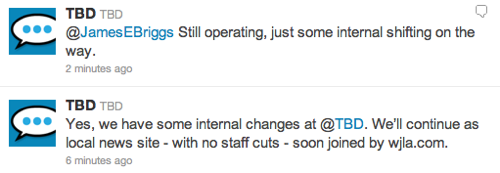
Big news for TBD today: The site, the Washington Post reported, is being taken over by owner Allbritton Communications’ TV station, WJLA. (On its six-month birthday, no less.)
This seemed, at first blush, dire news. (Jeff Jarvis: “I’m sitting shiva for TBD.com. So young.”) TBD has been known, after all — despite its corporate owner and TV partnership — for a particularly web-based approach to reporting that’s emphasized, above all, community engagement. Many of its biggest successes, so far, have been based on the kind of work that comes from an interactive, rather than broadcast-based, relationship with readers.
 But Erik Wemple, TBD’s editor-in-chief, says to put your funeral clothes away, everyone. TBD’s web-centric approach, shakeup notwithstanding, is still alive, and the outlet, though restructured, is still kicking. “Bad news in the media industry these days means that people are getting laid off — and no one’s getting laid off here,” Wemple told me. “We’re not shrinking”; in fact, “I would imagine our head count, if anything, would go up.”
But Erik Wemple, TBD’s editor-in-chief, says to put your funeral clothes away, everyone. TBD’s web-centric approach, shakeup notwithstanding, is still alive, and the outlet, though restructured, is still kicking. “Bad news in the media industry these days means that people are getting laid off — and no one’s getting laid off here,” Wemple told me. “We’re not shrinking”; in fact, “I would imagine our head count, if anything, would go up.”
The biggest immediate change that the shift will entail is the creation of a new website, WJLA.com, which will function as a companion site for TBD.com. The hope in that is expansion, rather than compression. “The idea there is to catch the traditional JLA audience, which is a bit more suburban, and the new TBD audience, which is a little more packed into the inner core of the District and the inner suburbs,” Wemple said — and, through that, to “maximize both audiences.”
Of course, time will tell whether and how the new TV station oversight will otherwise affect TBD’s editorial approaches. Broadcast and web, after all, have to a certain extent contradictory aims. And Jim Brady, who recently departed as TBD’s general manager, is tweeting another perspective: “At good companies, the people who resist necessary change are pushed aside. At bad companies, they are put in charge. RIP, the old TBD.” And: “I love my @TBD peeps, but the ‘everything will be OK’ tweet does not reflect how people feel. They can’t say it, but I can. Not good news.”
In the long run, though, there could be some interesting symbioses that emerge from the new structure. “We have to see how the companion site interpolates with the existing site — and I think there are technical and workflow issues to surmount there,” Wemple said. “But, for me, the ultimate thing by which I judge any ownership or enterprise is the level of investment — and the level of investment continues to be robust.”
And what about the community engagement work that has been at the core of TBD’s editorial (and, to some extent, business) philosophy? “Our community engagement runs so much through everyone here,” Wemple noted — “I wouldn’t want to work here if were weren’t deeply involved in getting out to the community.”
“I would just ask that people judge the product,” Wemple said. “I think that we will continue to emphasize and to engage the community in a way that is very competitive with the industry and industry standards.” And while, for a meta-media world that’s been watching TBD’s fortunes with fascination, today’s shakeup seems a blow, users themselves might see things differently. “I think that 99 percent of the people won’t really notice too much of a change,” Wemple said. And, furthermore: “I believe that most of our staff won’t feel this change too much. They’re going to continue cranking out stories, day in and day out.”